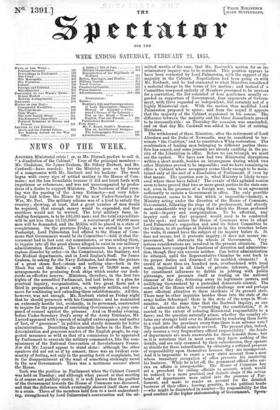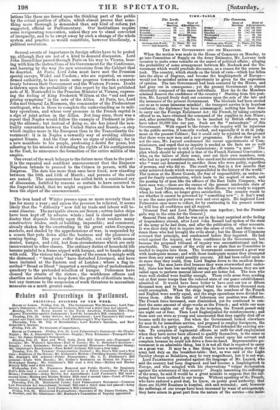NEWS OF THE WEEK.
ANOTHER Ministerial crisis ! or, as Mr. Disraeli prefers to call it, " a dissolution of the Cabinet." Four of the principal members— Mr. Gladstone, Sir James Graham, Mr. Sidney Herbert, and Mr. Cardwell—have seceded; but the Ministry goes on by favour of a compromise with Mr. Roebuck and his backers. The week began with every sign of settled mutiny in the House of Com- mons; not the less formidable because it did not burst forth with impatience or vehemence, and was not unaccompanied by profes- sions of a desire to support Ministers. The business of that even- ing was the passing of the Army Estimates—not very felici- tously laid before the House by the new Under-Secretary for War, Mr. Peel. The military scheme was of a kind to satisfy the country ; showing, at least, , that a great number of men would be required, that enough money would be expended, and that sacrifices would not be waived. The total military force, in- cluding foreigners, is to be 193,595 men ; and the total expenditure will be not less than 13,721,0001. A recruitment of 60,000 more men will be demanded, and the Militia will be placed in a state of completeness. On the previous Friday, as we stated in our last Postscript, Lord Palmerston had offered to the House of Com- mons that Government would be its Committee !—told it that Go- vernment had in fact sent out commissions, or was sending them, to inquire into all the great abuses alleged to exist in our military administration Eastward. The Commissioners have a power to replace disorder by order—in the Commissariat, the Sanitary, and the Medical departments, and in Lord Raglan's Staff. Sir James Graham, in asking for the Navy Estimates, had drawn the picture of a great steam fleet—steam and nothing else—both in the Black Sea and the Baltic ; with a force of 70,000 men, and arrangements for producing fresh ships which render our dock- yards an effective reserve. Ministers, therefore, in the first two nights of the assembled Parliament, had laid before it a plan for practical inquiry, reorganization, with two great fleets and a third in preparation, a great army, a complete militia, and mea- aures for continuing and extending these establishments. All this, however, was not enough. Mr. Roebuck stated on Friday night that he should persevere with his Committee ; and he nominated an extremely hostile list, evidently, in its personnel, constructed to inquire for the purpose of convicting Government—a jury com- peted of counsel against the prisoner. And on Monday evening, before Under-Secretary Peel's array of the Army Estimates, Mr. Layard appeared with a speech of mingled extravagance and matter of fact, of "greenness " in politics and sturdy demands for better administration. Describing the miserable inches in the East, the determination and generous resolve of the English people, he sug- gested measures so wild as that of a commission to be appointed by Parliament to overrule the military commanders, like the com- missioners of the National Convention of Revolutionary France. Nor did Mr. Layard appear to stand alone : although the other speakers did not act as if by concert, there was an evident com- munity of feeling, not only in the pouring forth of complaints, but in the disappointment at the want of something strikingly novel in the new Government. There was a mutinous manner about the House.
Such was the position in Parliament when the Cabinet Council was held on Tuesday ; and although what passed at that meeting is of course not publicly stated, it is well known that the position of the Government towards the House of Commons was discussed, and that the difference which eventually showed itself there came to a crisis. Three of the members held firm to a tacit understand- ing, strengthened by Lord Palmerston's conversation and the ad-
mitted merits of the case, that Mr. Roebuck's motion for an in- criminatory inquiry was to be resisted. This position appears to
have in contested by Lord Palmerston, with the support of the
majority n the Cabinet. Negotiations had been going on with Mr. Roebuck, and he had consented to what Ministers considered
a material change in the terms of his motion ; and instead of a
Committee composed entirely of Members presumed to be anxious for a conviction, the list consisted of four gentlemen usually re- garded as supporters of Government, four opponents of Govern- ment, with three regarded as independent, but certainly not of a highly Ministerial cast. With the motion thus modified Lord Palmerston proposed to agree ; and from the sequel it appears that the majority of the Cabinet acquiesced in his course. The difference between the majority and the three dissentients proved to be irreeoncileable : on Thursday the secession was announced, and on that day Mr. Cardwell was added to the list of retiring Ministers.
The withdrawal of these Ministers, after the retirement of Lord Aberdeen and the Duke of Newcastle, may be considered to ter- minate " the Coalition," and to constitute a Whig restoration. The combination of leading men belonging to different parties there- fore has ceased, and some journals are already exulting in the pu- rity of the Liberalism in office. Before we can triumph we must see the upshot. We have now had two Ministerial disruptions within a short month, besides an interregnum during which two other Ministers proved to be impossible ; and we have remaining in office a Cabinet whose occupancy seems likely enough to be main- tained only at the.cost of a dissolution of Parliament, if even by that means. The question now is, what Ministry is likely to suc- ceed where these have failed? The events of this agitated session seem to have proved that two or more great parties in the state can- not, even in the presence of a foreign war, come to an agreement sufficiently to sustain a Government in office. The only possible Government seems to be that which is impossible namely; a Ministry acting under the direction of the House of Commons. Government, following the steps of its predecessors, had already made considerable way in giving that which the House professed to seek—inquiry and reorganization. To be effectual, any inquiry such as that proposed would need to be conducted on the spot ; and unless the House of Commons were to adopt Lord Palmerston's suggestion and send its Select Committee to. the Crimea, to sit perhaps at Balaklava or in the trenches before the walls, it cannot have the subject of its inquiry before it. It does not secure, but' it prevents inquiry ; it does not secure im- provement, but obstructs the wheels of Government. Very serious considerations are involved in the present situation. The Commons have usurped the functions of direction and administra- tion, though they can execute neither. Can better administration be attained, until the Representative Chamber be sent back to its proper duties and disarmed of its mobbish elements ? A. crowd of more than six hundred men, overburdened with local work, implicated in all kinds of private, interests, impelled by constituent influences to dabble in jobbing with publics patronage, now presents itself as trading on the national clamour of the day, frittering away its legitimate powers, and nullifying Government by a pretended democratic control. The conduct of the House will necessarily challenge new and perhaps more effectual attention to these incidents of its present state. There may be other inquiries besides those into the state of the army before Sebastopol: there is the state of the corps in West- minster. At the same time that the Roebuck inquiry, as one of its advocates admits, is " stretching the constitution," it is carried to the extent of reducing Ministerial responsibility to a farce; and the question naturally arises, whether the country ob- tains any stronger hold over its Ministers by rendering them liable
to a visit into the provinces every time there is an adverse vote ? The question of official seats is revived. The present plan, indeed, only secures a very fragmentary official responsibility : the heads of departments are made answerable for those beneath them ; but as it is notorious that in most cases they know nothing of the details, and are only crammed by their subordinates, they operate as shields for those subordinates, by obtaining a softened pressure of responsibility upon themselves because they are incompetent.
And it is impossible to exact a very strict account from a man whose transitory occupation of office prevents his mastering his business. While he is let off,the permanent official who car- ries on affairs is irresponsible. .The House of Commons has set a precedent for calling. officials to account, w. itch awcottu.n be reduced to a more practical and into shape if p g heads of departments were called into the presence of Par- liament, and made to render an .account for th.e.bd business of their office; bility for the. leaving, possibly, to the political ea s —who might be diminished iu number—the regional good oonduot of the higher statesmanship of Goverment, BMW- lotions like these are forced upon the thinking part of the public TIME-TABLE by the actual position of affairs, which almost proves that some- The Lords• thing more thorough .is demanded than any kind of- reform yet Hour of Hour of suggested, official or Parliamentary.' Our institutions requireFriday s • 61s 81h 51 35m
some invigorating renovation, unless they are to stand convicted of incapacity, and to be swept away by such a change of the whole political revolution. system and ractice as would constitute, however bloodlessly, a



































